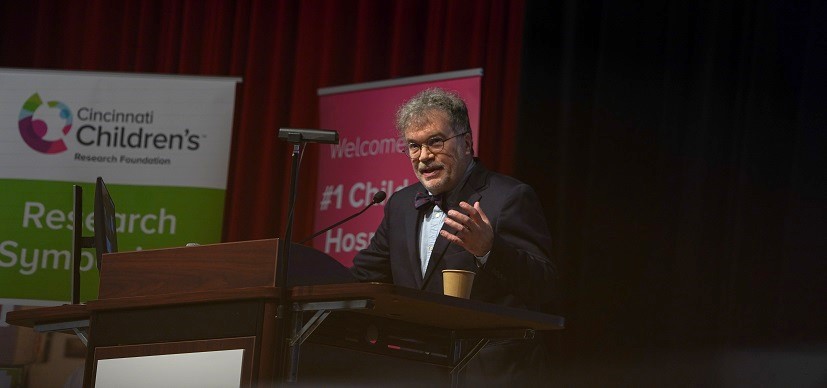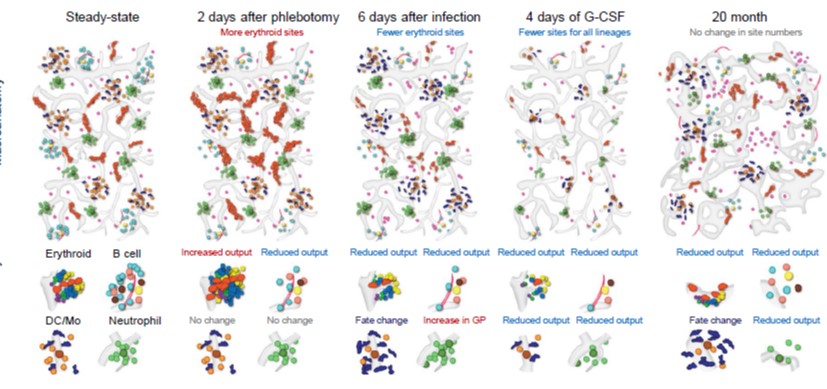Targeting the SARS-CoV-2 Replicase for Antivirals
Post Date: January 19, 2021 | Publish Date:

Seminar Recap: If coronaviruses could have bumper stickers, they would say, ‘Mutations happen.’
On Jan. 13, 2021, Mark R. Denison, MD, shared his research and insights on the biology of SARS-CoV-2 (COVID-19) as well as the mechanisms and potential targets for antivirals.
As one of the world’s leading experts on coronaviruses, Denison kicked off the Current Topics in COVID-19 Research Seminar Series, which features discussions with cross-disciplinary research professionals on the latest COVID-19 information and science. Hosted by the Cincinnati Children’s Divisions of Infectious Diseases and Biostatistics & Epidemiology, these free virtual seminars take place via Zoom on Wednesdays from 2-3 PM (ET) and are open to the public.
More than 120 physicians, research professionals, staff, and students tuned in from across the nation to hear Denison’s live virtual presentation, “Targeting the SARS-CoV-2 replicase for antivirals” (click here to watch the recording).
Denison is the Stahlman Professor of Pediatrics, Professor of Pathology, Microbiology and Immunology, and Director of the Division of Pediatric Infectious Diseases at Vanderbilt University Medical Center. He has been studying coronaviruses since 1984 and has made many groundbreaking discoveries in their biology, and in developing antivirals and vaccines.
For more than 30 years, the Denison Lab has been NIH-funded for investigation of the replication, pathogenesis, and evolution of coronaviruses, including SARS-CoV, MERS-CoV, and the current SARS-CoV-2 (COVID-19).
Young but widespread
Denison noted that coronaviruses are ubiquitous, explaining that the oldest known coronaviruses in humans have been around for less than 500 years, which is very short from an evolutionary perspective. SARS-CoV emerged in 2002 and MERS-CoV in 2012.
“The origin of these coronaviruses is likely from cattle, bats, or other animal species that humans interact with,” he said.
Denison advocates for global surveillance and interaction to catalogue and understand every potentially detrimental virus. “This would allow preparation of RNAs that could be used for vaccines during future outbreaks,” he said.
Coronaviruses including SARS-CoV-2 contain the largest and most complex RNA genome of any RNA virus and encode novel enzymatic functions including the only known RNA proofreading exonuclease.
“One really important point about RNA viruses, like coronaviruses, is that they make mutations,” said Denison. “If there was a bumper sticker on their car, it would say ‘mutations happen.’”
Denison reflected on the evolution of the COVID pandemic and the emergence of new variants, which raises concerns about the potential for future immune escape.
“Was I surprised that SARS-CoV-2 could do this? No,” noted Denison. “Was I shocked? Yes, along with everyone else, by its pluripotentiality and its capacity for such profound disease spread, adaptation, and persistence. Nothing I would have ever predicted, even in my worst nightmares of what it was capable of.”
Ongoing need for antivirals
Denison’s lab has identified multiple critical and unique viral enzymes as novel targets for antivirals and virus attenuation, including the proteases, RNA polymerase, and the novel CoV proofreading exonuclease. Since 2013, he and his team have focused on antiviral development and directed preclinical testing for anti-CoV antivirals, including Remdesivir and EIDD-2801 (Molupiravir).
“How does Remdesivir work?” asked Denison. “It works by inhibiting RNA synthesis, likely by multiple mechanisms, but the simplest way to say it is it acts like a stop sign.”
Remdesivir potentially inhibits multiple divergent coronaviruses and bypasses the proofreading function. It’s effective for prophylaxis and early treatment in mouse models of lethal SARS-CoV and in mouse models of Chimeric SARS-CoV/RdRp. It has also been shown to reduce the duration of the COVID-19 disease.
However, antiviral treatments, like Remdesivir, are only effective if the application is timed based on the disease course. When treatment allocation is not aligned with what we know of the biology—for example, Remdesivir provided when a COVID-19 disease patient is already in the hospital in need of oxygen—the treatments are ineffective, leading to misconceptions about the actual effectiveness of the drugs.
Denison wrapped up his presentation by reflecting on the COVID-19 vaccines currently being distributed and that some people may feel that antivirals are no longer necessary. “As we continue to have high caseloads of disease, we need to have multiple tools for this and future coronaviruses as well,” noted Denison. Antiviral strategies should still be considered as one of the multiple complementary tools we have to fight the pandemic and can be used in parallel with vaccines, especially since many people are not getting the vaccine for various reasons.
What’s next?
Next up in the Current Topics in COVID-19 Research Seminar Series, co-moderators Paul Spearman, MD, and Katherine Bowers, PhD, MPH, will host Robert Frenck Jr., MD, director of the Cincinnati Children’s Vaccine Research Center.
Frenck will present “COVID-19 vaccine development and implementation: The here and now,” where he will discuss the development of the current leading vaccine candidates, review data from the clinical trials evaluating these vaccines, and describe potential issues with implementation of vaccine delivery.
Join this virtual seminar at 2 pm (ET) Jan. 27, 2021, via Zoom.






